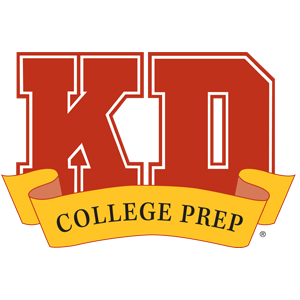It’s officially your first year as a high schooler! Now that you’re out of middle school, you’re probably taking some time to explore your options for school sports and other extracurriculars, not to mention forging new friendships along the way. It’s undoubtedly a busy time in your life, but don’t forget that you’ll also need to begin preparing for your college admissions tests, if you haven’t already done so.
College might still seem as if it’s the very distant future, but time will fly by faster than you might think. If you take the time to begin preparing for the SAT® and ACT® tests now, your future self will thank you. Use these 9th grade testing tips to get started.
Navigate Through This Article:
8 SAT/ACT Test Prep Tips for 9th Graders
1. Take a diagnostic test to establish your baseline score
Although you’re just beginning 9th grade, it can be helpful to take a diagnostic test to figure out what your starting point is. By taking this practice test, you’ll get a sense of what your scores might be if you were to take the SAT or ACT tests right now, and you’ll be able to identify the problem areas that you need to improve.
If you’re already enrolled in a prep program for the SAT/ACT tests, you may be able to take full-length diagnostic test through that program. (KD College Prep offers this with the Complete™ Program.) Otherwise, you can take practice tests for free through the organizations that administer the tests.
College Board® administers the SAT test, and ACT Inc. administers the ACT test. Both organizations offer free practice tests available via download, as well as digital practice tests using assistive technology. However, these organizations do not necessarily offer as many different practice tests as you might like to take throughout your high school years. You can access additional practice tests through a test prep program.
If you opt to take a practice test on paper, be sure to time yourself. Don’t fret if your scores aren’t where you’d like them to be. You’re just beginning your high school years, and so you won’t have as much exposure to the test content as a 10th or 11th grader would. Do take the time to thoroughly review the questions that you struggled with.
2. Research score ranges for colleges you’re considering
Now that you know your baseline scores, it’s time to identify which score ranges you’d like to achieve over the next few years. Choose a few colleges that appeal to you. It’s perfectly fine if you aren’t yet sure where you’d like to earn your degree—you still have plenty of time to figure that out. Just pick a few schools that you admire for various reasons (sports teams, strong English department, etc.).
Then, check the SAT and ACT test score ranges for those schools as reported to the Common Data Set (CDS) Initiative. The schools you selected should have reported composite SAT and ACT test scores, as well as scores across different sections of the tests. These are typically available on the schools’ websites. How do your scores compare?
3. Take challenging courses.
Now that you know your baseline scores and your target scores, it’s time to dive a little deeper into the next steps for reaching your target scores. Your first step is to visit your guidance counselor to discuss your course schedule and explore the courses available to you. Ask about adding courses that are more challenging, both for this year and for upcoming years.
There are two main reasons to take challenging courses. First, you’ll gain a better mastery of the academic material you’ll be tested on. Academically advanced courses might also help you develop stronger critical thinking and analytical reasoning skills—both of which are helpful for test taking. Second, your SAT and ACT test scores will only comprise part of your college applications. College admissions personnel also consider other facets of your education, such as the difficulty level of your courses. They generally like to see students who challenge themselves.
4. Explore tutoring options
There are few truly worthwhile shortcuts in life. In order to raise your scores, you’ll need to commit to putting in the work. However, that doesn’t mean you need to go it alone. In fact, students who partner with a tutor are more likely to reach their academic goals. According to a Brookings Institution review of 96 academic studies, tutors can be “remarkably effective at helping students learn.” Their research found that a student who tests in the 50th percentile can improve to the 66th percentile with the help of a tutor.
You might not necessarily need a tutor for every subject. However, working with a tutor may help you improve your grasp of the subject areas that you find most challenging. Depending on where you live, you may have access to either free or paid tutoring services.
Tutors may be available through any of the following:
- Public and private schools
- After-school programs
- Local libraries
- Community centers
- Colleges (Some colleges implement programs that connect college student tutors to local K-12 students in need of assistance)
- Nonprofit organizations (online and offline)
- Private tutoring and test prep organizations
Maybe your grades are fine, but you struggle with the SAT, ACT, or PSAT tests. At KD, we offer a variety of test prep programs to give students the extra practice they need to reach their score goals. We also offer one-on-one tutoring sessions for students who prefer to work alone with an instructor or need a little extra guidance. By improving your grasp of the material with the help of your tutor, you’ll be better prepared to tackle the SAT and ACT tests.
5. Read often
Among all the 9th grade testing tips you can implement, reading often is one of the most important. If you already love to read, great! Keep up the good work! Try to read a wide variety of material—fiction and nonfiction books, magazines, and even informative newsletters and blogs. Enjoy reading your favorite authors, but also try to broaden your perspective by seeking out new authors.
If you’re a reluctant reader, do not worry! Maybe you just haven’t found a type of book or group of authors you enjoy. Think about the other things you enjoy. If you love sports, look for books that feature sports prominently. If you love disaster movies, look for dystopian young adult (YA) fiction. Keep looking until you find the right niche for you, and get ready to finally fall in love with reading.
Why is reading every day a great way to prepare for the SAT and ACT tests? The more you read, the better your fluency, vocabulary, and reading comprehension will become. The SAT and ACT tests both feature timed reading passages. You’ll need to understand the vocabulary words, as well as the overall message of the piece. Reading every day for pleasure is a passive way to improve your test taking skills, and it can be a lot of fun!
6. Answer one practice question every day
You’ve just started high school, so 9th grade test prep shouldn’t include spending hours every day studying. If you try to do too much too soon, you may find yourself becoming a little burned out. Instead, try answering just one practice SAT and/or ACT test question every day. If you stick with it, you will have answered so many practice questions that by the time you’re ready for the real tests, you may feel more confident about your abilities.
For current KD students, our team of advisors can provide specific recommendations for how often you should attend test prep activities in 9th grade. Our team will examine your specific goals, level of progress, and availability. We’ll provide a plan based off these important factors.
7. Take the PSAT 8/9 test
Your school may offer a test designed for 8th and 9th graders, called the PSAT™ 8/9 test. Even if you already took it in 8th grade, it’s a good idea to take it again this year. It won’t be the same exact content. The PSAT 8/9 test provides invaluable practice and may enable you to become a more confident test taker. Plus, your results will offer clues regarding your strengths and weaknesses. You’ll learn which areas you need to spend more time working on.
When you receive your results, pay attention to the score report section entitled “AP Potential.” This will let you know if you could be ready to enroll in Advanced Placement® (AP) classes. If so, discuss this possibility with your guidance counselor.
It’s also smart to get familiar with the PSAT test early on in high school. The 11th grade test is used to determine National Merit® Semifinalist eligibility, which can open doors to scholarships.
Schools can offer the PSAT 8/9 test from September through April. Your guidance counselor can connect you to the necessary information for your school. If you’re homeschooled, you can request PSAT 8/9 testing at a local school district.
8. Enroll in a summer prep classes for the SAT/ACT test
If you haven’t yet begun working on your SAT/ACT prep journey, summer might be a great time to start. Summer break allows more time to focus on reaching your goals.
Consider enrolling in our 9th Grade Complete™ Program, which offers live-online and in-person class options. You’ll work through a comprehensive curriculum that includes lessons, instructor-led workshops, student activities, and practice tests. Keep in mind that the Complete™ Program is more than a summer program—families pay a one-time fee to have access to test prep activities until graduation, if needed. So when the summer ends, you’ll still be able to continue your prep.
Can You Take the SAT or ACT Test In 9th Grade?
Yes. In fact, it’s possible to take the SAT and/or ACT tests as early as 8th grade. Students who take the tests this early typically expect to take the tests again later on.
Should I Take the SAT or ACT Test In 9th Grade?
Although it’s possible to take the SAT and ACT tests in 9th grade, we usually recommend that students wait until 11th grade to take these tests. Students may be discouraged by low scores when they take the tests too early, but these decisions can vary greatly by student.
At this point in your high school career, you haven’t yet been exposed to all of the advanced concepts that you’ll be tested on. Naturally, a typical student can expect to get a lower score than they will in 10th or 11th grade. There’s still a lot of material left to learn, like Geometry and Algebra II. Our best advice? Speak to an expert who can make testing recommendations that are unique to you.
Do Colleges Look At the 9th Grade PSAT Test Score?
One of the perks of taking the PSAT 8/9 test is that, although you should try to earn a good score, you shouldn’t feel as much pressure to score as high as you will on the SAT and ACT tests. Instead, taking the PSAT 8/9 test is much like taking a practice test. Although you’ll receive a score report, your scores won’t be passed along to any colleges. It also won’t be used for National Merit® Semifinalist consideration, as this only applies to the 11th grade test.
What Topics Are On the PSAT 8/9 Test?
Like the SAT test, the PSAT 8/9 test will evaluate your reading, writing, and math skills. The reading and writing sections cover reading comprehension, vocabulary in context, and graphics interpretation. In the math section, you’ll answer questions about algebra, data analysis, and similar problems.
What Is a Good PSAT Test Score for a 9th Grader?
The PSAT 8/9 test has a different score range than the PSAT/NMSQT® (National Merit Scholarship Qualifying Test). Scores on the PSAT/NMSQT test (11th grade) and the PSAT 10 test (10th grade) range from 320 and 1520. On the PSAT 8/9 test, however, the composite score range is between 240 and 1440. Read more about PSAT score ranges.
Your score report will indicate which percentile you fall into. A higher percentile is ideal. For example, if you score in the 75th percentile, that means 75% of your peers scored at or below your score. Remember to keep your scores in perspective—each student’s scores (and goals) are different. Try not to compare yourself to others too often and instead focus on what you need to do to reach your goals.
Should I Guess on the PSAT 8/9 Test?
The PSAT 8/9 test does not penalize students for guessing, just like on the official SAT and ACT tests. If you don’t know the answer to a question, skip it for now and go back to it later. If you still don’t know the answer when you return to it, take your best guess.
Need Help Preparing For College Admissions Tests?
KD College Prep is committed to helping you achieve your college admissions and scholarship goals. Contact us today to request a free consultation, and find out which of our test prep programs could be a good fit for you.














































